Introduction
Land acquisition specialists are crucial to the advancement of energy and infrastructure projects, especially as the emphasis on renewable energy and decarbonization intensifies. These professionals are tasked with identifying and securing suitable land parcels, a process that demands thorough title research and strategic negotiations with landowners. Their role is exemplified by companies such as Energy Transfer LP, which manages extensive operations across the U.S. and requires meticulous compliance with regulatory standards.
In addition to their technical responsibilities, land acquisition specialists must adeptly navigate complex legal frameworks and local zoning laws to ensure regulatory compliance. The historical case of Bruce’s Beach, where property was seized through eminent domain, underscores the importance of managing legal risks in land transactions. Furthermore, these specialists are essential in stakeholder coordination, engaging with government agencies, environmental consultants, and community members to facilitate project approval and execution.
The challenges faced by renewable energy projects, such as supply chain disruptions and rising interest rates, highlight the necessity of effective stakeholder management.
Experts like Righetti, who chairs the Carbon Capture, Utilization and Sequestration Permitting Task Force, emphasize the evolving legal environment surrounding energy development. Her insights into subsurface property law and regulatory compliance are vital for land acquisition specialists, who must stay abreast of the latest legal and technological advancements to navigate the complexities of modern energy projects successfully.
Key Responsibilities of Land Acquisition Specialists
'Land procurement experts are essential to the success of power and infrastructure initiatives, especially in the present environment where sustainable resources and decarbonization efforts are gaining traction.'. These professionals are responsible for identifying and securing suitable property parcels, a task that involves thorough title research and strategic negotiations with property owners. For example, Energy Transfer LP, which manages one of the largest energy asset portfolios in the U.S., highlights the high stakes involved in property procurement, as their extensive operations across 44 states require meticulous adherence to regulatory standards.
Beyond the technical aspects, acquisition specialists must navigate complex legal frameworks and local zoning regulations to ensure that initiatives meet all regulatory requirements. This was evident in the historical case of Bruce’s Beach, where property was seized through eminent domain, highlighting the importance of understanding and managing legal risks in land transactions.
Furthermore, these specialists play a crucial role in stakeholder coordination, interacting with government agencies, environmental consultants, and community members to enable approval and execution. 'The challenges faced by renewable power projects, as reported by the New York Times, underscore the necessity of effective stakeholder management.'. 'The offshore wind sector, for instance, has faced significant hurdles due to supply chain disruptions and rising interest rates, yet states in the Northeast continue to push for wind power, illustrating the ongoing need for adept coordination and negotiation skills.'.
As noted by experts like Righetti, who chairs the Carbon Capture, Utilization and Sequestration Permitting Task Force, the legal environment surrounding resource development is evolving. Her insights into subsurface property law and regulatory compliance are essential for specialists who must remain informed about the latest legal and technological advancements to successfully navigate the complexities of modern energy projects.
Skills and Qualifications Required
To thrive in their position, property procurement specialists require a combination of technical and interpersonal abilities. They must have a robust understanding of real estate law, property rights, and local regulations, which is crucial for navigating the complex legal landscape. Effective negotiation skills, analytical thinking, and meticulous attention to detail are also essential. Usually, a bachelor's degree in areas like real estate, urban planning, or environmental science is necessary, along with pertinent certifications in property procurement or real estate. The ability to collaborate and communicate effectively with various stakeholders, including attorneys, government officials, and community leaders, is vital. This multidisciplinary approach ensures that specialists can handle the dynamic challenges of sustainable resources and infrastructure development, positioning them as leaders in their field.
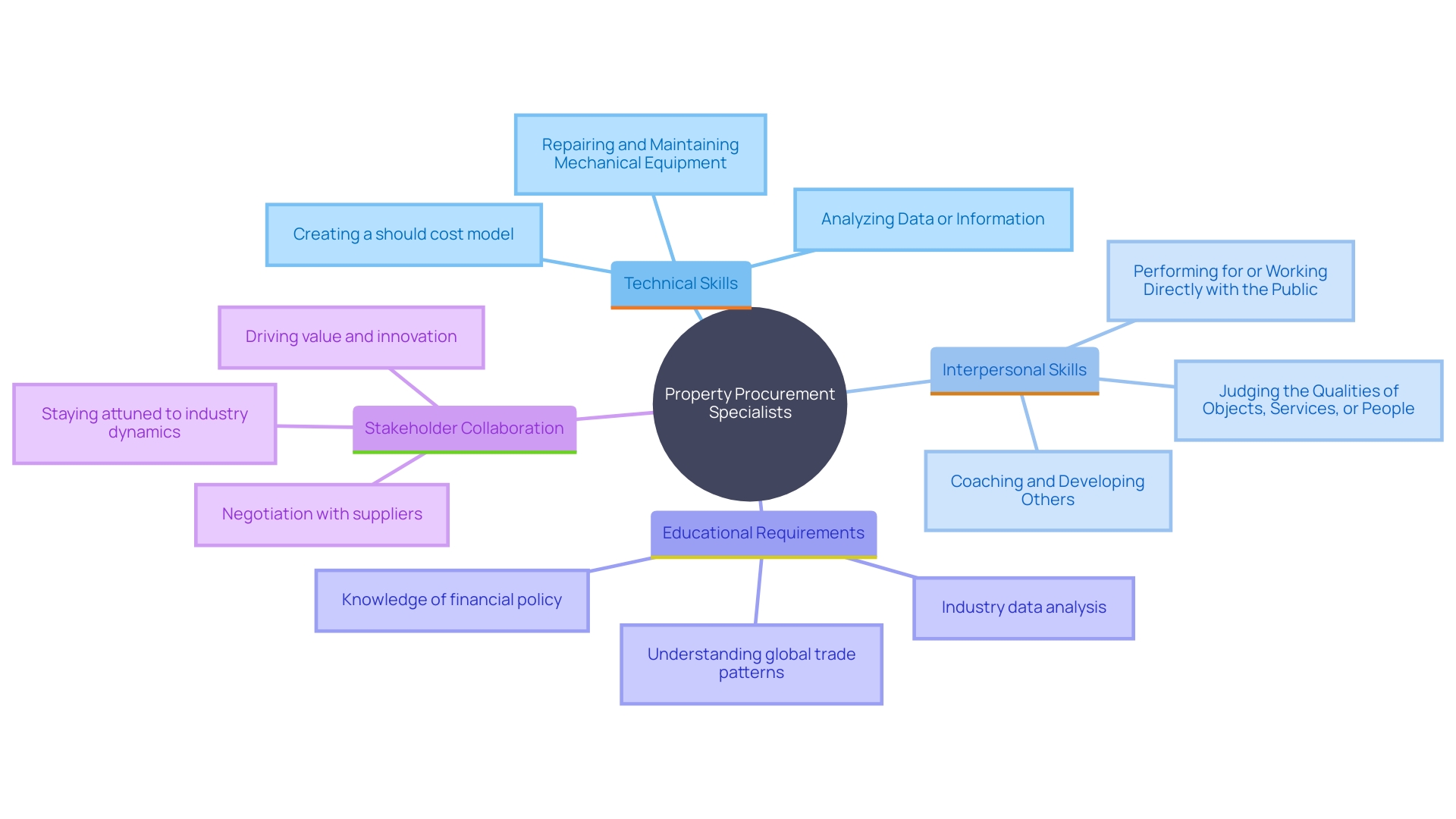
The Process of Land Acquisition
The process of obtaining territory for power and infrastructure initiatives is complex and varied. At first, experts perform detailed site evaluations to recognize areas that meet the requirements of the initiative. This step is critical for minimizing environmental impact, especially in renewable energy projects like solar arrays, which, despite their benefits, face significant regulatory challenges. For instance, new solar developments often require 2-5 years for permitting approval due to stringent environmental regulations.
Following site assessments, due diligence is performed, which includes comprehensive title searches and environmental assessments. This step ensures that any potential legal or environmental issues are identified early. Compliance with laws such as the National Environmental Policy Act (NEPA) and state versions like the California Environmental Quality Act (CEQA) is mandatory, despite the added delays and costs these regulations impose. These laws, originally designed to protect the environment, now often add 2-6 years of delay through exhaustive compliance requirements.
Once the land is deemed suitable, negotiations with landowners commence to secure purchase agreements. This phase can be particularly complex in regions where conflicting interests and regulatory hurdles are prevalent. Effective negotiation strategies are essential for reaching agreements that are beneficial for both parties involved.
Upon reaching an agreement, the purchase is finalized through legal documentation, ensuring that all regulatory requirements are met. This includes obtaining the necessary permits and approvals, which can be a lengthy process. For example, the development of solar initiatives often requires thousands of pages of environmental impact statements to guard against litigation aimed at delaying efforts.
In summary, the property procurement procedure, while crucial for advancement, is significantly shaped by regulatory systems intended to guarantee environmental preservation. These regulations, although essential, frequently result in considerable delays and expenses, highlighting the significance of careful planning and strategic discussions in securing energy and infrastructure projects.
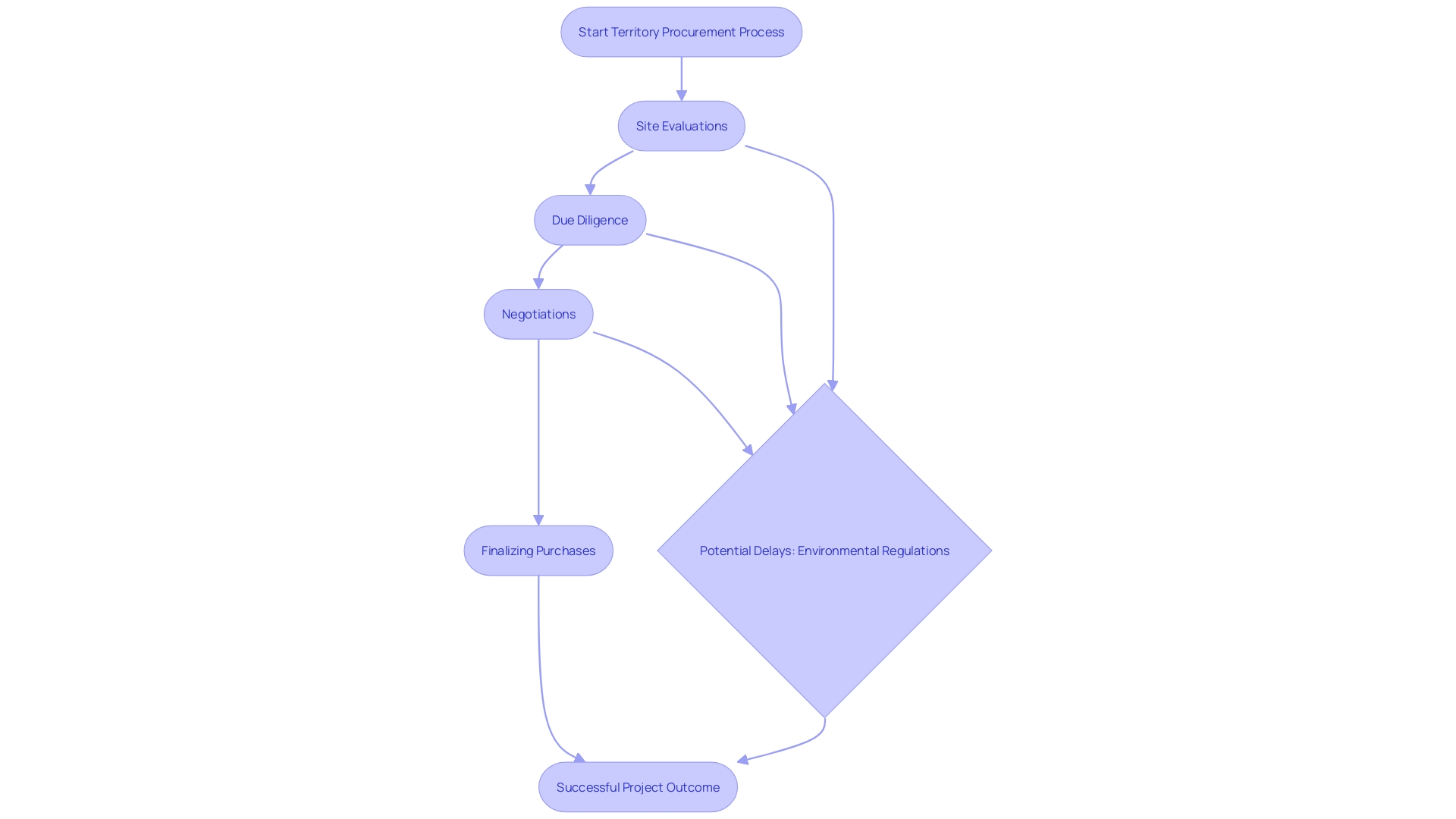
Regulatory and Legal Considerations
Land procurement involves navigating a multi-layered legal framework, including local, state, and federal regulations. Key among these are the National Environmental Policy Act (NEPA) and state counterparts like the California Environmental Quality Act (CEQA), which, while intended to promote transparency, often result in significant delays and high compliance costs. Experts must also manage zoning regulations, usage policies, and other legal stipulations to guarantee complete adherence and prevent disputes.
Understanding these frameworks is essential. As emphasized by Lyle Solla-Yates, a specialist in urban and environmental planning, lowering obstacles to property procurement can greatly influence affordability and development. Furthermore, the Land Law 2024 in Vietnam emphasizes the significance of state-managed property use rights, which further complicates the procurement landscape by adding layers of state-mandated property valuation and pricing regulations.
Furthermore, specialists must conduct thorough due diligence to identify any easements, encroachments, or liens that could affect the property's title. 'Recent lawsuits, such as the City of Chicago v. BP et al., illustrate the potential legal entanglements in property procurement, emphasizing the need for meticulous legal scrutiny to avoid future disputes and liabilities.'. These complexities emphasize the essential role of specialists in ensuring that all legal and logistical aspects are managed efficiently during the procurement process.
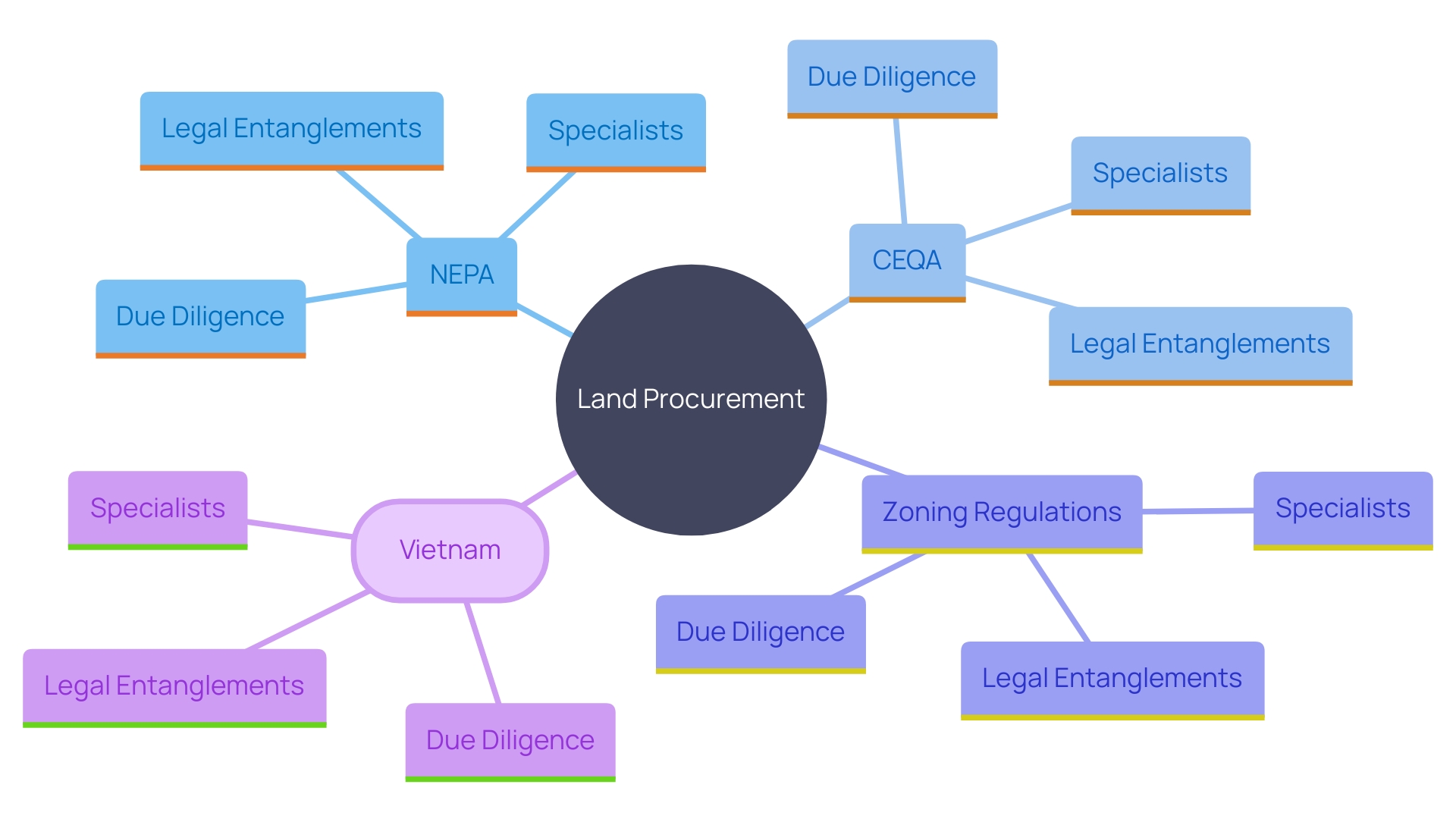
The Role of Technology in Land Acquisition
Technology has transformed the property acquisition process, significantly enhancing efficiency and accuracy. Geographic Information Systems (GIS) are now essential in analyzing spatial data to identify optimal parcels, facilitating more strategic decisions. The state of Minnesota, for instance, has harnessed GIS to address public issues like eliminating child poverty and improving infrastructure.
Advanced title research software powered by artificial intelligence further streamlines the due diligence process. This innovation reduces the time needed to gather and analyze property information, thus speeding up timelines. As noted at Qualia’s 2024 Future of Real Estate Summit, AI is ushering in a transformative era for the title industry by enhancing operational effectiveness and connectivity between departments.
Moreover, AI's impact extends beyond efficiency; it also boosts accuracy in appraisals and improves safety on construction sites. According to McKinsey Global Institute, real estate companies have seen over a 10% increase in net operating income through AI-driven efficiencies. This technological evolution enables property purchase experts to make informed choices more quickly and with greater reliability, ultimately speeding up project completion.
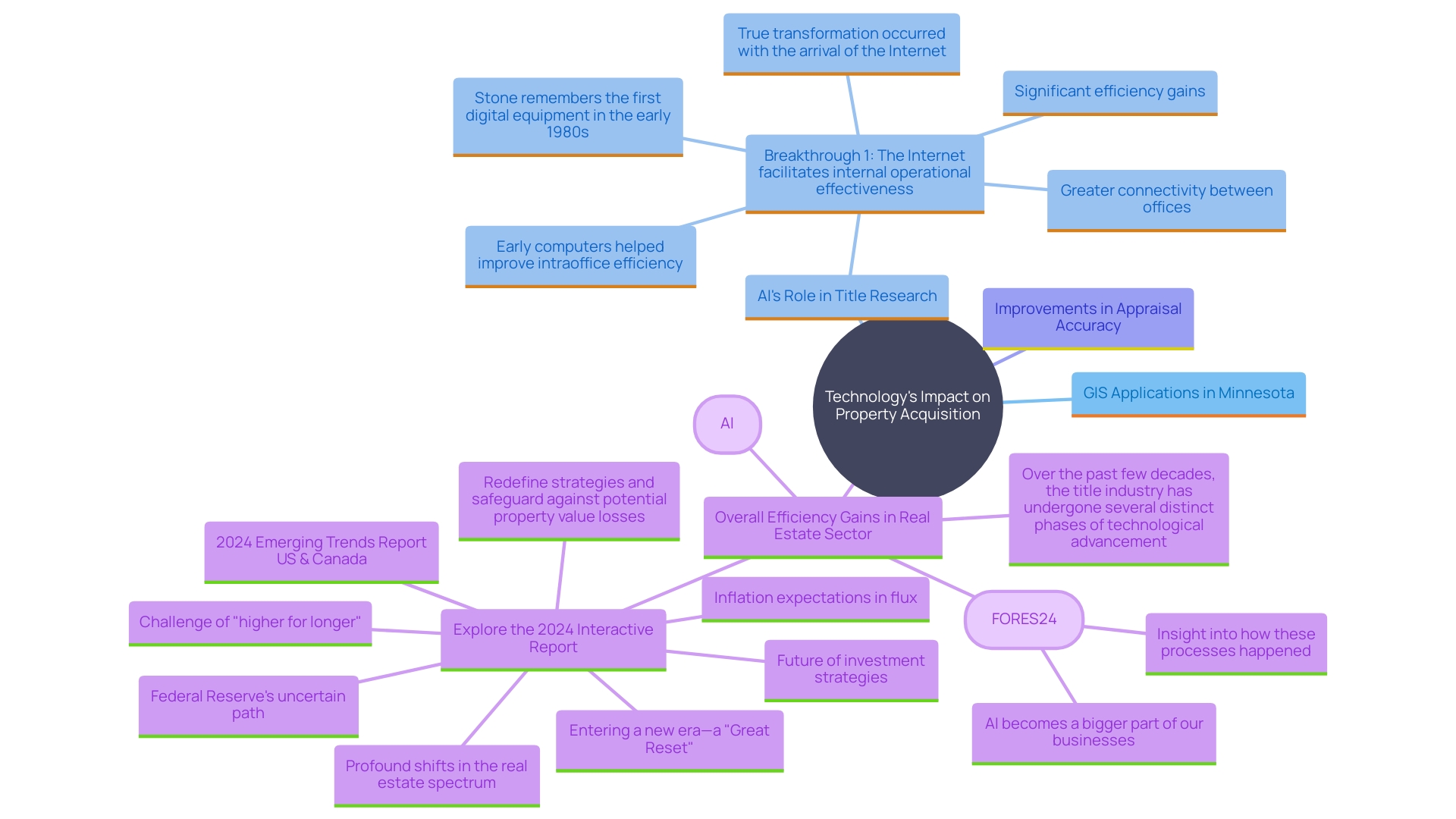
Challenges and Opportunities in Land Acquisition
'Navigating the property procurement landscape presents numerous challenges, including fluctuating real estate markets, community opposition, and intricate regulatory environments.'. Specialists must excel in strategic planning and stakeholder engagement to effectively address these issues. For instance, the U.S. Department of Energy's recent report highlights the diverse approaches to renewable resources planning and approval across states, underscoring the complexity land acquisition professionals face.
Opportunities are plentiful, especially in the growing demand for renewable power initiatives and infrastructure enhancements. As Jeff Marootian, Principal Deputy Assistant Secretary for Energy Efficiency and Renewable Resources, notes, there’s a significant opportunity to deliver the benefits of clean power nationwide. 'This feeling is supported by research groups concentrating on reducing disputes in solar installations, such as ensuring that the use of terrain for solar farms can coexist with farming activities.'.
Land acquisition specialists play a pivotal role in these developments by leveraging their expertise to identify and secure optimal land solutions. By understanding and navigating the regulatory landscapes and engaging with communities effectively, they can help mitigate opposition and foster consensus, ensuring the successful implementation of renewable energy projects.
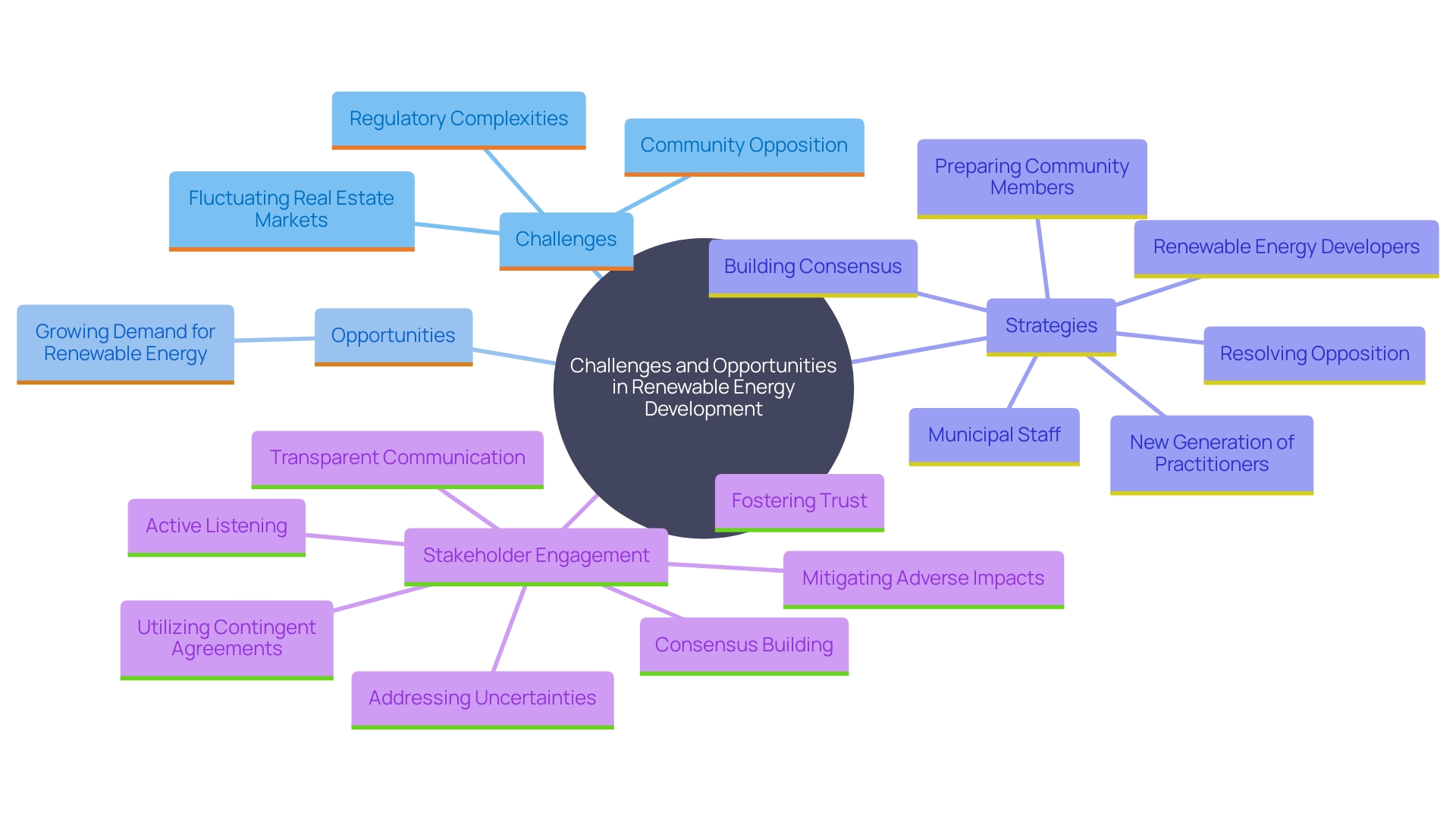
Conclusion
Land acquisition specialists play a crucial role in advancing energy and infrastructure projects, especially as the demand for renewable energy rises. Their responsibilities include identifying suitable land parcels, conducting thorough title research, and negotiating with landowners, all while navigating complex legal frameworks and zoning laws. Historical examples, such as Bruce's Beach, highlight the legal risks involved in land transactions, underscoring the necessity of specialized knowledge.
To succeed, these professionals must possess a blend of skills, including a solid understanding of real estate law and effective negotiation abilities. Educational qualifications typically include degrees in relevant fields and certifications in land acquisition.
The land acquisition process involves several steps, from site assessments to due diligence and final negotiations. Regulatory frameworks like NEPA and CEQA, while vital for environmental protection, can lead to significant delays and costs. Therefore, specialists must employ strategic planning to navigate these challenges effectively.
Technological advancements, such as Geographic Information Systems (GIS) and AI-driven tools, have transformed the acquisition process, enhancing efficiency and accuracy. These innovations allow specialists to make informed decisions quickly, expediting project timelines.
Despite challenges such as fluctuating real estate markets and community opposition, the increasing demand for renewable energy presents substantial opportunities. By leveraging their expertise and engaging with communities, land acquisition specialists are essential for the successful implementation of renewable energy projects, driving progress toward a sustainable future.




